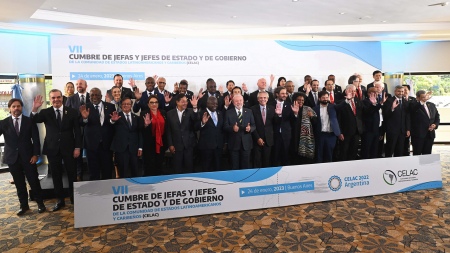Foreign Minister Santiago Cafiero described as “forceful and categorical” the international support for Argentina’s claim on the Malvinas, expressed this week in Buenos Aires at the Summit of the Community of Latin American and Caribbean States (Celac), in a special statement that the bloc regional office issued on the claim of sovereignty that the country maintains over the islands of the South Atlantic usurped by Great Britain.
The head of Argentine diplomacy also highlighted in a dialogue with Télam that in “barely three years and through the diplomatic deployment of the Government headed by President Alberto Fernández, Argentina managed to put Argentine rights over the islands back on the world stage.”
“The Heads of State and representatives present highlighted the permanent interest of the countries of the region in that the Governments of the Argentine Republic and the United Kingdom resume negotiations in order to find a peaceful and definitive solution to said dispute”Cafiero pointed out in referring to this statement, formulated last Tuesday during the VII Celac Summit held in Buenos Aires.
In addition, the official appreciated the “support” of the president of Brazil, Luiz Inácio Lula da Silvaexpressed at the regional meeting the “legitimate rights of Argentina in its dispute with the United Kingdom regarding the Malvinas, South Georgia and South Sandwich Islands, and the surrounding maritime spaces.”

The Malvinas were usurped in 1833 by the British, who forcibly expelled the Argentine authorities and settlers, and it was not until 1965 that the United Nations ruled that there was a “sovereignty conflict” with the United Kingdom and urged both countries to negotiate, but the British have refused to do it for 40 years.
Cafiero also highlighted another CELAC’s special declaration on “nuclear disarmament” in which it “reaffirms the commitment to consolidate Latin America and the Caribbean as a ‘Zone of Peace’ and urges the Community to “promote general, complete and discriminatory as a priority objective”.
This represents a position of the regional bloc that is directly related to the Argentine claim over the Malvinas and the suspicions that the United Kingdom has transferred nuclear weapons to the Atlantic during the war in 1982.
The relevance of a South Atlantic Peace and Cooperation Zone (ZPCAS) as a platform to promote cooperation projects, “particularly taking into account the geopolitical and strategic importance of that region”, had already been valued in the joint declaration with Brazil last Monday, during Lula’s visit to Buenos Aires.
Celac, an intergovernmental mechanism for dialogue and political agreement that brings together 33 countries, Thus, at the Buenos Aires Summit, it reiterated its “firmest support for the legitimate rights” of the Argentine Republic in the “sovereignty dispute over the Malvinas, South Georgia and South Sandwich Islands and the surrounding maritime spaces.”
The issued document expresses the “permanent interest” of the countries of the region in that the governments of Argentina and the United Kingdom of Great Britain and Northern Ireland resume negotiations in order to find, as soon as possible, a peaceful and to said dispute, in accordance with resolution 2065 (XX) of the General Assembly of the United Nations and other pertinent ones”.
Celac resolved to entrust the pro tempore presidency (now in charge of the Prime Minister of Saint Vincent and the Grenadines, Ralph Gonsalves) to request the Secretary General of the United Nations, the Portuguese, Antonio Guterres, to renew the “efforts in the fulfillment of the mission of good offices entrusted to it by the General Assembly through successive resolutions, in order to resume negotiations” between Argentina and Great Britain.
In parallel, Celac praised Argentina’s diplomatic deployment in relation to the Malvinas Cause at the Summitwhen affirming that “it recognizes the permanent constructive attitude and full disposition of the Argentine Government to reach, through negotiations, a peaceful and definitive solution to this anachronistic colonial situation”.


















